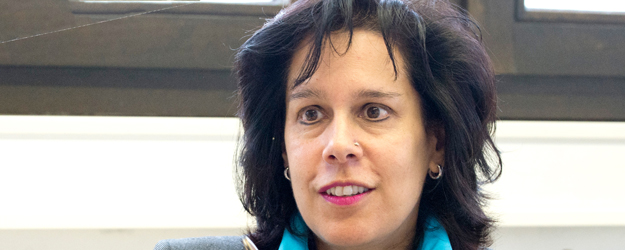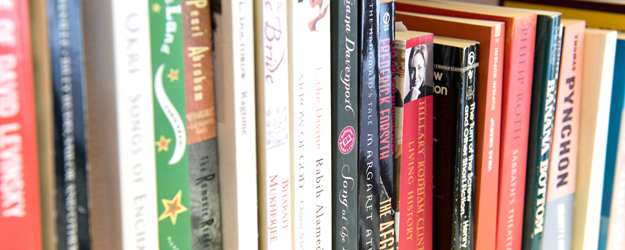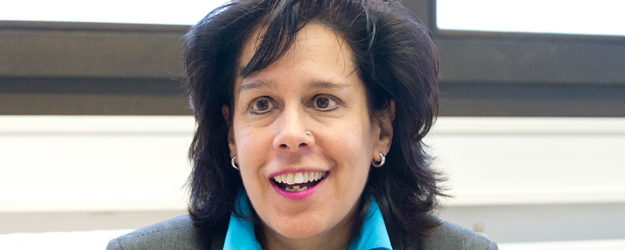26 February 2014
The new research training group 'Life Sciences, Life Writing: Extreme Experiences of Human Life between Biomedical Explanations and Life Experiences" attempts to bridge the gap between the natural-medical sciences and the humanities. The German Research Foundation is providing almost EUR 2 million to support this unusual project at Johannes Gutenberg University Mainz (JGU).
Natural sciences and humanities are drifting apart. "We humanities scholars are often skeptical of what medical researchers and natural scientists have to say," says Professor Mita Banerjee of the American Studies division at Mainz University. "We tend to demonize them or we accuse them of failing to take into consideration the very fundamental principles behind what they do. And they respond by saying that we don't do anything but talk, that we never look at hard facts and figures." Because of this, Banerjee claims: "We need to be more open. If we want to reconcile our different fields, we need to talk to one another. That way we both win."
Academics and scientists working in various disciplines at Johannes Gutenberg University Mainz have now taken the first step in this direction by initiating the 'Life Sciences, Life Writing: Extreme Experiences of Human Life between Biomedical Explanations and Life Experiences' research training group. The German Research Foundation is sponsoring the group at Mainz University and will initially be providing almost EUR 2 million in funding over the next four and a half years. But what does the training group signify for the humanities and the cultural studies disciplines?
Life Sciences, Life Writing
Professor Mita Banerjee and Professor Norbert W. Paul, who is Director of the Institute of the History, Philosophy, and Ethics of Medicine at the Mainz University Medical Center, are the coordinators of the new group. Starting in April 2014, twelve doctoral candidates will have the opportunity to work in a quite unique research and training program.
These young academics will have one foot in the disciplines of the natural sciences and medicine and the other in the disciplines of the humanities and cultural studies. The purpose of the research projects they will be undertaking will be to analyze extreme human experiences from a wide variety of perspectives.
Banerjee sees 'life writing' as one of the most important areas of her scholarship. "How does a person who has been born with the help of artificial insemination feel; what exactly is it like to have three parents? What goes through your head if you come into the world like that?" In order to find answers to such questions, research into life writing moves beyond traditional literary forms. "In addition to autobiographies we also look at other forms of personal records, such as blogs, diaries, and self presentation in various media."
Bringing the disciplines closer
However, humanities scholars quickly reach their limits. "What is called life cannot be explained without using the findings of medicine or the natural sciences. We humanities scholars generally have no idea what these disciplines can even do. What has long been standard practice in the field of medicine often looks like science fiction to our students."
Banerjee dislikes the distance between the disciplines. She started talking to colleagues from other spheres. "As a Fellow at the Gutenberg Research College I had the freedom and time to do so. The GRC makes it possible to undertake such non-specific activity. The Fellowship is a wonderful institution."
She grew excited about possible interdisciplinary solutions. She then met Professor Norbert W. Paul. "I saw his institute as a bridge between the University Medical Center and the humanities – it was only possible through this cooperation to create this kind of research training group."
She visited Professor Manfred E. Beutel, Director of the Department of Psychosomatic Medicine and Psychotherapy, and Thomas Efferth, Director of the Pharmaceutical Biology section of the Institute of Pharmaceutical Sciences and Biochemistry at Mainz University. "He knows a lot about Chinese medicine, which coincides with our focus on transnational life stories." And then there is Dr. Ralf Dahm, Director of Scientific Management at the Institute of Molecular Biology (IMB). "I wrote an article with him about aging. I found it an important step toward interdisciplinary work."
Promoting interdisciplinary research
A lively exchange of ideas followed these first contacts. "At first, it didn't seem that the result would be a research training group." In addition to Paul, Beutel, Efferth, Dahm, and Banerjee, the core of people who helped bring the group to life included cultural anthropologist Professor Dr. Michael Simon as well as Professor Alfred Hornung and Professor Oliver Scheidig, both American Studies professors and the heads of the Life Writing mini-research training group that was set up as part of the 'Pro-Humanities' initiative. Professor Cay-Rüdiger Prüll and Dr. Susanne Michl of the Institute of the History, Philosophy, and Ethics of Medicine were also among the researchers who put their weight behind the proposal. A series of associated academics were also involved. They include scholars from the US, Australia, New Zealand, China and India.
"We basically prepared the ground for our Ph.D. students," says Banerjee. "We have already learned a lot about the disciplines involved, their methodology, and the logic at work within them. And we all agree: if we can't achieve dialog within the group, it will automatically run into trouble."
Applications from around the world
The doctoral candidates will have one supervisor from the humanities and cultural studies field and one from the natural sciences and medical disciplines. "We who will be acting as supervisors know each other and this is a huge advantage. We don't compete, but cooperate. We will help our postgraduate students bridge the gap between the sciences."
Applications from around the world are already being received by the new research training group at Mainz University. "It is amazing how many individual interdisciplinary projects are already out there," enthuses Banerjee. "We will combine them to try to give them the best possible level of support."
The twelve graduate students will be placed next door to one another at the Institute of the History, Philosophy, and Ethics of Medicine at the Mainz University Medical Center. Their offices are all in the same hallway. "We have created the framework," says Banerjee. "Now we need to fill it with graduate students. We still don't know exactly what to expect. I am really looking forward to it."



